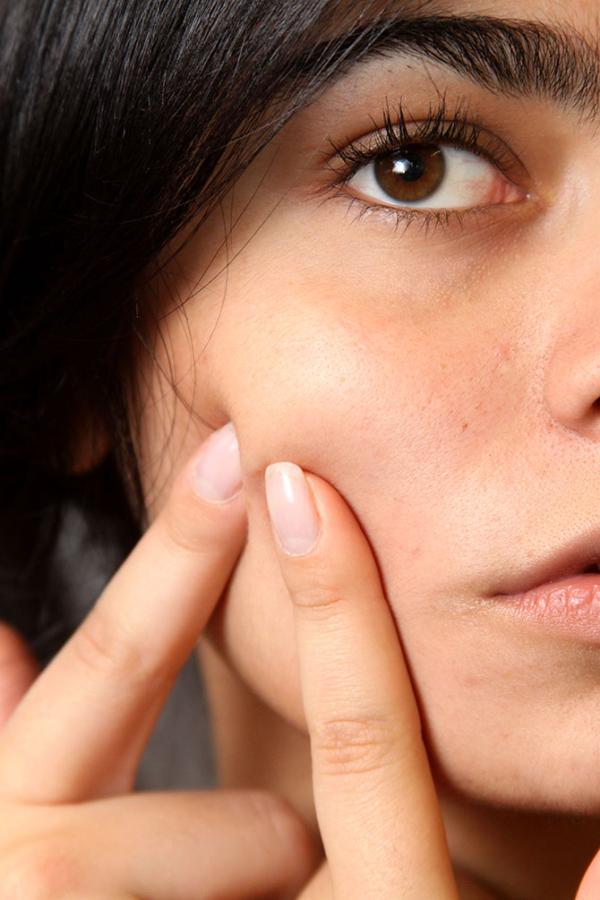 | « Back to article | Print this article |
High humidity causes sweat, dirt and dust along with other toxins to build up on the surface of the skin. Dr Saumya Shetty Hegde tells you how to take care.

In the rains, our skin is prone to infections -- fungal, bacterial and parasitic -- and skin allergies.
Specifically, wet clothes worn for long hours lead to fungal infections in underarms and other private parts of the body.
Similarly, wet feet gives rise to mixed infections or results in athlete's foot, commonly seen in males.
Bacterial and fungal infections dominate this season, and especially attack the feet.
Allergies and skin eczema tends to flare and increase in monsoon.
People commonly approach dermatologists with eczema of hands and feet.
Oily skin
Exposure to heat followed by extreme humidity impacts oily skin in the most unfavourable manner.
This worsens the existing acne and proliferate whiteheads, blackheads and pimples.
Dry skin
Lack of moisture content and skin oils in most cases leads to dryness, which implies that soaps and solvents are better able to penetrate your skin and pull out natural skin oils.
Most often, health conditions or genetic predisposition makes the skin dry in nature. With the rise of the humidity levels in the air, dry skin usually tends to get even drier.
In monsoons your skin behaves in an unpredictable manner.
It fluctuates from oily to dry skin.
A good skin care daily regime with a well balanced diet and exercise routine is the key for maintaining a balanced skin.
Here are some tips:
Use a cleanser
Use a mild soap free cleanser twice daily for washing the face.
A facial scrub for dead skin exfoliation twice a week is recommended.
This must be followed by a mild alcohol free toner to clear residual skin impurities and reduce pores at least once daily.
Don't forget sunscreen
A sunscreen is essential even on a cloudy day as the UV rays can penetrate the cloud cover and harm the skin.
Sunscreen must be used daily to prevent skin damage in monsoon.
Bathe twice a day
Due to the constant wetness, your skin tends to dry and there will be general body itchiness.
A lukewarm water bath followed by good moisture twice daily helps to minimise the discomfort.
Mild chemical peels under dermatologists supervision rejuvenates your dull skin in monsoon and maintains the skin PH balance.
Drinking plenty of fluids, especially water, is important.
Go light on makeup
Heavy makeup in monsoons must be avoided.
Ideally, waterproof and transfer resistant makeup products must be used.
Nowadays, there are new dermatologically tested light, sheer makeup products available in the market.
Use of waterproof eyeliners, mascara and light transfer resistant lipsticks are advisable.
Avoid heavy foundation base and use lightweight mousse or souffle powders as a base.
Sheer coat of light pink or brown lipsticks and lip-gloss must be used.
Guarantee a complete removal of makeup at the day-end followed with light moisture.
Make sure you sterilise the make-up tools like brushes and applicators on regular basis to prevent skin infections.
Care for your hair
One also needs to take care of their hair in monsoon.
A proper hair care regime can help in preventing these issues.
A good shampoo and conditioner is essential at least 2-3 times weekly.
Avoid too many styling products and gels as it would make the hair greasy.
Oiling once a week is beneficial.
Wear hair in simple hairstyles or keep it short for easy manageability.
Consume more of vegetables, salads-n-soups after appropriate cleansing and boiling.
During monsoon, humidity in the air gets increased so the skin becomes ultra dry.
This is why regular cleansing is important to keep skin healthy.
For people with dry skin, you must stay hydrated at all times.
Cleansing is important during the monsoon.
High humidity causes sweat, dirt and dust along with other toxins to build up on the surface of the skin. So you have to keep it nourished.
Loss of moisture makes your skin appear dry and lifeless.
You must apply a moisturiser and sunscreen at least 3 to 4 times a day.
For oily skin, one should use very mild cleanser during monsoon to get rid of dead skin and dirt off.
Use pure oatmeal scrub as it works wonders. This scrub will help cleanse oily skin.
You can also use ripe papaya pulp as a mild exfoliator.
Tips for stress-free hair
One should keep their hair tied in monsoon.
Go for shorter haircuts if you want to avoid dirt which settles on your scalp. It will also help you get rid of split ends.
Don’t let your hair get wet in rains; this will make your scalp get an itchy feeling. You may even get dandruff.
Always cover your hair.
It is important to rinse your hair with a gentle shampoo and also condition it.
While travelling, cover your head with a scarf or a cap to protect your hair from probable damage.

Dr Saumya Shetty Hegde is medical director and CEO of The Roots Clinic, a complete skin and hair aesthetic centre located in Chembur, Mumbai.